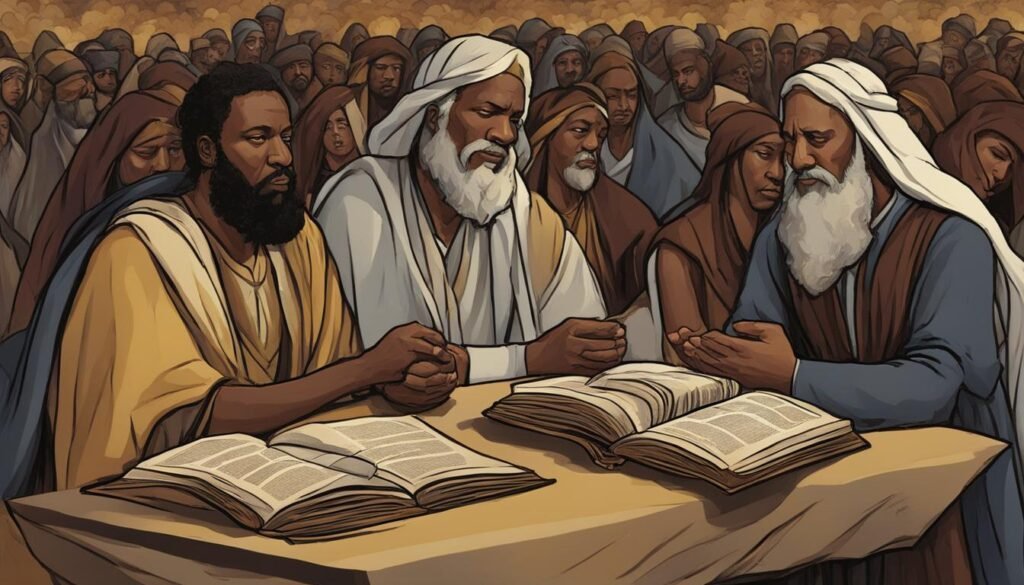The King James Version of the Bible offers various passages that touch on the subject of mixing races. These passages provide insight into the biblical perspective on interracial relationships and marriages. Some verses emphasize the unity among believers in Christ, while others caution against intermarriage with people of different nations.
Key Takeaways:
- The Bible highlights the unity among believers in Christ, regardless of race or nationality.
- There are passages that caution against intermarriage with people from different nations.
- The Bible teaches that all nations and races descended from a common ancestry.
- While the Bible does not specifically address human race mixing, it provides guidance on avoiding the mixing of different kinds or species.
- Intercultural marriages in the Bible had both positive and negative consequences, depending on the context and faith of the individuals involved.
Galatians 3:28 – Unity in Christ
In the King James Version of the Bible, Galatians 3:28 provides a significant perspective on interracial marriage and relationships. The verse states, “There is neither Jew nor Greek, there is neither bond nor free, there is neither male nor female: for ye are all one in Christ Jesus.” This powerful declaration emphasizes the unity and equality that believers in Christ share, transcending all human distinctions, including race.
This verse highlights the inclusive nature of Christianity, where the primary focus is on the unity found in Christ, rather than external differences. It affirms that in the eyes of God, race does not define a person’s worth or value. Instead, the emphasis is placed on the common bond believers have through their faith in Jesus.
Galatians 3:28 echoes the teachings of Jesus, who emphasized the importance of love, compassion, and acceptance towards all people, regardless of their race or background. It embraces the concept that all individuals, regardless of their ethnic or cultural differences, are equal in the eyes of God and should be treated as such.
Galatians 3:28 – Unity in Christ
The biblical perspective on interracial marriage presented in Galatians 3:28 encourages believers to embrace the unity and love that can be found in Christ, transcending racial boundaries. It serves as a reminder that as followers of Jesus, we are called to love and accept one another, valuing the unity we share in our common faith.
Daniel 2:43 – Mixing Nations
As we explore the biblical perspective on race mixing, we come across Daniel 2:43, which offers intriguing insights into the topic. This scripture metaphorically speaks of the merging of different nations, comparing it to the mixing of iron with clay. The verse states, “And whereas thou sawest iron mixed with miry clay, they shall mingle themselves with the seed of men: but they shall not cleave one to another, even as iron is not mixed with clay.” This passage suggests that while there may be mixing between nations, maintaining unity can be challenging, just as iron and clay do not easily adhere to each other.
The metaphor used in Daniel 2:43 implies that societies composed of various nationalities may encounter difficulties in coexisting harmoniously. It highlights the potential for clashes and divisions that can arise from the mixing of different cultures, traditions, and ideologies. While the verse does not explicitly refer to race mixing among individuals, it prompts us to consider the challenges associated with maintaining unity in a diverse society.
It is important to note that the interpretation of this scripture may vary among scholars and theologians. Some may view it as a cautionary message against the societal consequences of mixing nations, while others may argue for a metaphorical representation of power struggles and conflicts within human history. Nevertheless, Daniel 2:43 provides valuable insight into the complexities of relationships between different groups and offers a nuanced perspective on the topic of race mixing.
The inclusion of Daniel 2:43 in the King James Version of the Bible invites further contemplation on the dynamics of interracial relationships and the potential challenges they may bring. It encourages individuals to approach the subject with thoughtfulness and understanding, recognizing both the unity and the difficulties that can arise from the mixing of nations and races.

Seeking Wisdom and Guidance
While Deuteronomy 7:3 offers insight into the caution against intermarriage with specific nations, it is crucial to seek God’s wisdom and guidance when considering relationships and marriages. Each individual’s circumstances and convictions may vary, and it is important to prayerfully discern and seek counsel from trusted spiritual leaders and mentors.
Ultimately, the Bible teaches us to love our neighbors as ourselves and to treat others with respect, regardless of their racial or ethnic background. As Christians, we are called to follow the example of Jesus, who welcomed and embraced individuals from all walks of life.
Instead of focusing solely on a single verse, we should strive to understand and apply the broader biblical principles of love, unity, and acceptance in our relationships and interactions with people of all races and ethnicities.
2 Corinthians 6:14 – Unequal Yoking
One of the scriptures that is often referenced in discussions on race mixing in the King James Version of the Bible is 2 Corinthians 6:14. This verse advises believers not to be unequally yoked with unbelievers, emphasizing the importance of seeking relationships with those who share their faith.
The verse states, “Be ye not unequally yoked together with unbelievers: for what fellowship hath righteousness with unrighteousness? and what communion hath light with darkness?” This passage reminds believers that there is a fundamental difference between those who follow God’s righteousness and those who do not. It encourages believers to consider the compatibility of their values, beliefs, and goals when entering into relationships.
While 2 Corinthians 6:14 does not explicitly address race mixing, it provides a broader principle that can be applied to the topic. The verse prompts believers to evaluate the potential challenges and conflicts that may arise when partnering with someone who does not share their faith. It encourages believers to prioritize spiritual compatibility and mutual understanding in their relationships.
Nehemiah 13:23-27 – Consequences of Intermarriage
In Nehemiah 13:23-27, we read about the repercussions of intermarriage within the context of Israel. It describes Jews who had married wives from Ashdod, Ammon, and Moab. This passage serves as a cautionary tale, illustrating the negative outcomes that can arise from intermarriage with individuals from nations that did not share Israel’s faith.
Interracial marriages, in the specific context of this passage, resulted in the adoption of foreign customs and practices that were contrary to the teachings of the Israelites. It led to a dilution of their faith and a departure from their distinct identity as God’s chosen people.
While this passage focuses on the consequences faced by the Israelites, it does not provide a blanket statement on interracial marriages in general. It highlights the importance of marrying someone who shares the same faith and values, as it is crucial for maintaining a strong spiritual foundation and a unified community.
It is important to note that interpretations of this passage may vary, and it should be understood within its historical and cultural context. The intention is not to discourage interracial marriages altogether, but rather to emphasize the significance of choosing a life partner who aligns with one’s beliefs and values.
FAQ
What does the Bible say about mixing races KJV?
The King James Version of the Bible contains various passages that touch on the subject of mixing races. These passages provide insight into the biblical perspective on interracial relationships and marriages.
What does Galatians 3:28 say about unity in Christ?
Galatians 3:28 states, “There is neither Jew nor Greek, there is neither bond nor free, there is neither male nor female: for ye are all one in Christ Jesus.” This verse highlights the unity among believers in Christ, emphasizing that all distinctions, including racial ones, are insignificant in the eyes of God.
What does Daniel 2:43 teach about mixing nations?
Daniel 2:43 speaks of mixing between nations and uses the metaphor of iron mixed with clay. The verse states, “And whereas thou sawest iron mixed with miry clay, they shall mingle themselves with the seed of men: but they shall not cleave one to another, even as iron is not mixed with clay.” This passage suggests that while there may be mixing between nations, there will be challenges in maintaining unity.
What is the biblical view on race mixing according to Acts 17:26?
Acts 17:26 says, “And hath made of one blood all nations of men for to dwell on all the face of the earth, and hath determined the times before appointed, and the bounds of their habitation.” This verse emphasizes that all nations and races descended from a common ancestry and were created by God.
What does Leviticus 19:19 teach about the mixing of different kinds?
Leviticus 19:19 instructs, “Thou shalt not let thy cattle gender with a diverse kind: thou shalt not sow thy field with mingled seed: neither shall a garment mingled of linen and woolen come upon thee.” While this verse does not specifically address human race mixing, it does provide guidance on avoiding the mixing of different kinds or species.
Does Deuteronomy 7:3 allow interracial marriage?
Deuteronomy 7:3 warns against intermarriage with certain nations, stating, “Neither shalt thou make marriages with them; thy daughter thou shalt not give unto his son, nor his daughter shalt thou take unto thy son.” This passage cautions against intermarriage with people from specific nations for the purpose of preserving the faith of the Israelites.
What does 2 Corinthians 6:14 say about unequal yoking?
2 Corinthians 6:14 advises believers not to be unequally yoked with unbelievers, stating, “Be ye not unequally yoked together with unbelievers: for what fellowship hath righteousness with unrighteousness? and what communion hath light with darkness?” While this verse does not explicitly address race mixing, it encourages believers to seek relationships with those who share their faith.
What are the consequences of intermarriage according to Nehemiah 13:23-27?
Nehemiah 13:23-27 recounts the influence of intermarriage on the people of Israel, stating, “In those days also saw I Jews that had married wives of Ashdod, of Ammon, and of Moab.” This passage highlights the negative consequences of intermarriage with people from nations that did not share Israel’s faith, such as the adoption of foreign customs and worship.

